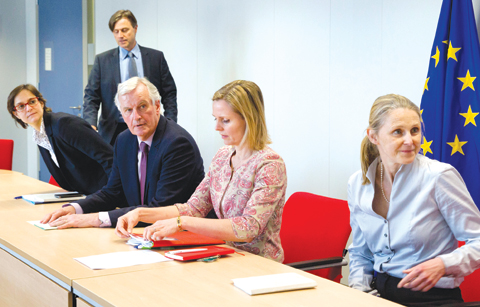 BRUSSELS: European Chief Negotiator for Brexit Michel Barnier (third left) meets with members of ‘The 3 Million’ at EU headquarters in Brussels. The 27 European Union nations head into two years of divorce negotiations with Britain as a solid bloc and said yesterday that there is a large consensus on the tough guidelines for their Brexit negotiators which are to be approved at tomorrow’s summit. — AP
BRUSSELS: European Chief Negotiator for Brexit Michel Barnier (third left) meets with members of ‘The 3 Million’ at EU headquarters in Brussels. The 27 European Union nations head into two years of divorce negotiations with Britain as a solid bloc and said yesterday that there is a large consensus on the tough guidelines for their Brexit negotiators which are to be approved at tomorrow’s summit. — AP
LONDON: The British hotel and leisure industry is set for a bumper year as a weak pound boosts demand from foreign tourists and deters Britons from travelling abroad, a survey by Barclays showed yesterday. Nearly two-thirds of international holidaymakers surveyed by the bank said they were more interested in holidaying in the UK compared with this time last year. The top driver of this was the weaker pound, cited by 31 percent, while greater spending power was cited by 30 percent. "2017 looks set to be a strong year for the British hospitality sector with both domestic and international visitors increasingly intent on spending more time here," Mike Saul, head of hospitality and leisure at Barclays, said.
"The impact of a weak sterling, at least temporarily, has boosted the UK's international appeal." The weaker pound means that Britons conversely get less bang for their buck abroad, and rising inflation is also fuelling demand from domestic holidaymakers. Nearly a third of UK holidaymakers expected to spend more of their holiday time in Britain this year, and 38 percent of those who cited cost as a factor said that the weaker pound had made holidays in the UK preferable to going abroad.
The pound is down around 15 percent since Britain voted to leave the European Union. Out of international holidaymakers, 31 percent said they were more likely to visit Britain than before the referendum last June, although about a half of those asked said the vote had no impact on their likelihood of making a trip. The Barclays report surveyed almost 10,000 guests from the UK, continental Europe, the US, Middle East, Asia and Australia.
Car production rises
In another development, British car production rose to a 17-year high in the first three months of 2017, as rising overseas demand offset weaker appetite from domestic car buyers, the country's automotive industry said yesterday. Car production has been one of the strongest areas of British manufacturing in recent years, bolstered by heavy foreign investment and a recovery in global markets, but the industry fears a hit when Britain leaves the European Union.
More than three quarters of cars produced in Britain are exported, and overseas demand grew 7.6 percent in the first three months of 2017 versus a 4.3 percent fall in domestic demand, the Society of Motor Manufacturers and Traders said. In March alone British car makers produced 170,691 vehicles, 7.3 percent more than a year earlier and the highest number for any month since March 2000. This took first quarter output to its highest since 2000 as well, with 471,695 cars manufactured.
Sterling has fallen sharply since June 2016's vote to leave the EU, giving British exporters a temporary cost advantage - though in the automotive sector much of that is mitigated by heavy use of imported components. "UK car manufacturing is accelerating thanks to billions of pounds of investment committed over the past few years," SMMT chief executive Mike Hawes said.
The SMMT expects British annual car production to beat its all-time peak of more than 2 million in 2020, if Britain retains easy access to European markets after Brexit. "Much of our output goes to Europe and it's vital we maintain free trade between the UK and EU or we risk destroying this success story," Hawes said. He added that he was also concerned about possible measures to penalise diesel cars, which made up almost half of production.
Separately, the Confederation of British Industry said the government needed to focus on reaching a trade deal with the EU in the two years that remain before Britain leaves, rather than arguing over an exit bill that is likely to cost tens of billions of euros. "For both sides, leaving the negotiating table without a deal shouldn't be 'Plan B' but 'Plan Z'. Whether it's tariffs or regulation, a no deal scenario would have chilling effects on both sides of the Channel," CBI director-general Carolyn Fairbairn said.- Agencies




